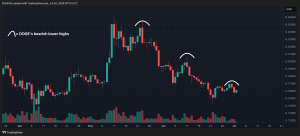El Salvador’s president announced on Twitter three days ago that his country had “bought the dip”, and had purchased a further 500 BTC at an average price of just over $30,000. However, this purchase added to the others still puts the country around $37 million down overall.
Bukele decided not to make a swift $1 million by not trading his country’s latest BTC acquisition. Almost certainly he was never thinking to do this, but if he had, he might have made a million that could have been put to good use for his beleaguered homeland.
He knows this isn’t the way to play the game, and that these investments now are El Salvador’s wealth in the decades to come. A tweet yesterday by the president probably more accurately describes his thinking on the matter:
It could be argued that the president is well ahead of his time by purchasing bitcoin now. Picking up BTC in a raging bull market would certainly be a lot easier than in the current climate, with many of his countrymen worried that the price of BTC might go down even further.
It must certainly take a great depth of character for Bukele to face the raging tide that is threatening to engulf him. Repeatedly buying bitcoin while the banking sector, the IMF, and even some of his own countrymen throw threats and anti-bitcoin sentiment his way, makes for a courageous stand.
However, in order for the experiment to succeed Bukele must continue to hold firm. He knows that his impoverished country has no future if it becomes entangled in the tentacles of the pro dollar IMF.
Many of those from the traditional banking sector would like nothing better than to see Bukele and El Salvador fail. This can certainly happen of course, and all the disruptive technologies in the history of the world have gone through similar failures before the tech won out.
Given just how corrupt and rotten our financial system is though, the sooner people can understand the game-changing properties of bitcoin, the sooner we can change over to a fairer system that is beyond the reach of governments and central banks to manipulate.
Disclaimer: This article is provided for informational purposes only. It is not offered or intended to be used as legal, tax, investment, financial, or other advice.




















